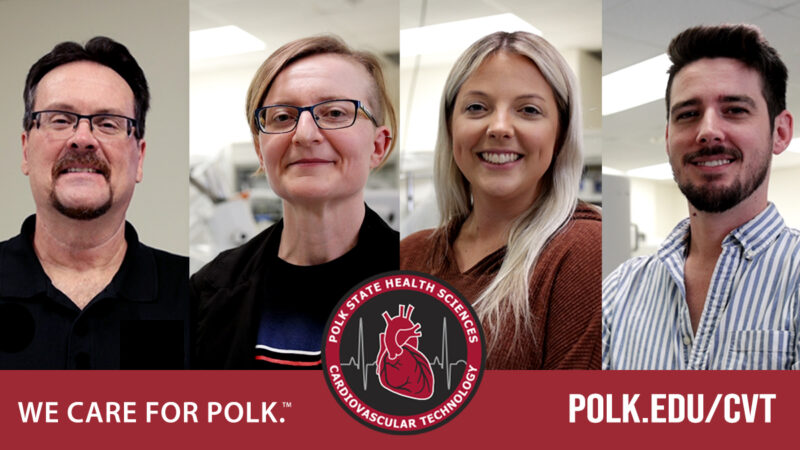Polk State Cardiovascular Technology students achieve rewarding careers before graduation

Polk State College’s Cardiovascular Technology (CVT) Program celebrates a 100% job-placement rate and a 95% licensure pass rate on first attempts, with many students receiving job offers before they even have their Associate in Science degrees in hand.
Patrick Metz-Corrigan and Kayla Worth, 2021 graduates of the Polk State CVT Program, had job offers at their choice hospitals by their final semester. In a field that’s growing much faster than the average job, and a median pay that is more than $78,000 per year, the two-year CVT Program is an affordable and accessible pathway to a rewarding career.
“Polk State prepared me for success by teaching me the basics in the classroom and in the lab,” said Worth, who serves as a cardiovascular technologist at Winter Haven Hospital – BayCare. “They have everything you need so that when you go into clinical, you know everything.”
Cardiovascular technologists work with physicians in the diagnosis and treatment of coronary artery disease and peripheral artery disease, assisting during angioplasty and stenting, monitoring patients during procedures, and providing pre- and post-procedural patient care.
Worth was inspired to enter the field having grown up with heart problems herself.
“I always knew that I wanted to be in the medical field,” she reflected. “When I was born, I had a murmur – a hole in the heart – and had to have a PDA (patent ductus arteriosus) coil put in. Now I get to assist with that procedure with my patients.”
“The most rewarding thing about my career is seeing really sick patients come in and seeing them a few days later after they see us and they’re being downgraded from ICU and they’re on their way to being discharged,” Worth added. “It’s a really good feeling.”
“Polk State prepared me for success by teaching me the basics in the classroom and in the lab. They have everything you need so that when you go into clinical, you know everything.”
Metz-Corrigan shares a similar appreciation for his profession.
“One of the most rewarding parts of my job, with Tampa General Hospital being a heart failure and transplants hospital, is we’ll see patients come in pre-transplant who are waiting to get a heart and then we will see them directly after getting the heart,” he said. “We follow up for years, we learn their names, we meet their families. It’s rewarding to see them recover.”
He described the Polk State CVT Program as personable, hands-on, and rigorous with small class sizes and instructors with extensive experience in the field.
“It is very hands-on with all the equipment. At first, it feels like pretend. But then once you’re in the hospitals in the clinical setting, you’re working with similar – if not the same – equipment and putting what you’ve learned into use,” he explained.
Metz-Corrigan completed clinical rotations at three sites during his time in the program. Before graduation, he had a job offer from each.
“I was able to figure out which one would be the perfect fit. I have been there for over two years now at Tampa General,” he said. “It’s a high-skilled hospital with complicated procedures. Tampa General has a lot of new procedures, first-in-the-state procedures, and has done one or two first-in-the country procedures.”
Worth quickly found her place in the cardiovascular technology realm too.
“By my second semester, I knew that I was going to be working at Winter Haven Hospital. It was a really good feeling knowing that they wanted me as an employee there,” she said. “Polk State helped me with my letters of recommendation and getting the hiring process taken care of, and I was graduating with a job.”
“I would recommend any aspiring cardiovascular technologist to come to Polk State. Two short years prepare you to work directly in the field as an entry-level cardiovascular technologist.”
Program Director Kevin Ferrier is proud of his students and graduates, whose success is a testament to the quality of the highly reputable program he has worked to build since 2007.
The limited-access, highly sought-after CVT Program at Polk State accepts applications from April 15 through June 30 for classes that begin in August. Interested individuals are encouraged to visit polk.edu/cvt for more information about the program and admission criteria.
“I would recommend any aspiring cardiovascular technologist to come to Polk State. Two short years prepare you to work directly in the field as an entry-level cardiovascular technologist,” Ferrier said. “The field is wide open. Our graduates all receive employment – sometimes multiple offers – upon graduation or even before graduation.”
The program’s Clinical Education Coordinator, Jennifer Dunifon, knows this firsthand as a 2010 graduate of Polk State’s CVT Program.
“We have state-of-the-art facilities. We mimic a lot of real life here in our campus labs,” Dunifon said. “We have great relationships with hospitals around the area. We have a great reputation, and a lot of local employers want to hire Polk State students.”
“There is a huge demand for cardiovascular technologists in this area and beyond. There are multiple different ways you could take your career.”
Ferrier pointed to a 14% job growth forecast – much faster than the average job – through 2030.
“What that means for our students is that our students will be able to find jobs.”

